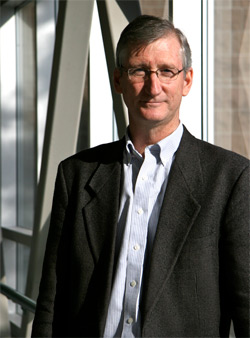This year, the Canadian Association of Physicists (CAP) and its Division of Condensed Matter and Materials Physics (DCMMP) awarded the 2011 Brockhouse Medal to Professor Bruce Gaulin of McMaster Univeristy for his contributions to using X-ray and neutron scattering techniques for advancing the understanding of collective phenomena in magnetic, superconducting, and structural systems.
CAP and DCMMP’s Brockhouse Medal was named in honour of Professor Bertram Brockhouse, whose contributions to research in condensed matter physics in Canada were recognized in 1994 with the Nobel Prize in Physics. The Brockhouse Medal was then created in 1999 to recognize and encourage outstanding experimental and theoretical contributions to the realms of condensed matter and materials physics.
Bruce is an experimental condensed-matter physicist, working in the area of scattering studies of exotic ground states in new materials, focusing on those with magnetic properties. He directs the Brockhouse Institute for Materials Research at McMaster University, where he is a professor in the Department of Physics and Astronomy. He, along with his team of graduate students and postdocs, make new magnetic materials that have interesting and exotic properties at very low temperatures. They have three strategies for doing this : they build in “geometrical frustration,” where the architecture of the ions within the crystals they make is formed by triangles or tetrahedrons; they build up quantum magnetic materials where the magnetic atoms possess the smallest possible magnetic moments; and they build up crystals made of two-dimensional stacks, or bundles of one-dimension structures. Each of these strategies tends to produce magnetic materials which remain in an unusual disordered state, even at very low temperatures.
His team later studies these crystals of new materials in the hopes of shedding light on their exotic properties. They often analyze them through x-ray scattering, neutron scattering, or using muon-spin-resonance (MuSR) techniques. To do this, they utilize facilities around the world – including the equipment and expertise here at TRIUMF. In collaboration with UBC Professor Rob Kiefl and his group, they performed neutron scattering studies of magnetism at low temperatures in a class of new “frustrated” magnets. Rob proposed complementary MuSR measurements as well, and as a result they discovered that the “frustrated” magnetic moments were not only disordered in space, but also fluctuating in time. Usually when magnetic materials are cooled down to low temperatures, the motion of the magnetic moments stops, but this was not the case – making this discovery a very exciting one! This was one of the first experiments to show this type of exotic phenomena at temperatures as low as 0.02 degrees above absolute zero.
Bruce was delighted with the honour of the Brockhouse Medal, “Coming from CAP, it’s coming from my peers, which always means a lot.” he said. “Its easy to keep myself humble as my work is always carried out in collaboration with groups of students and scientists, such as those in the MuSR group at TRIUMF. I think of it as a reflection of the efforts of this large group of talented people.”
Congratulations on your achievement, Bruce, and good luck with your future experiments! -- Writtin by Lindsay Davies, Communications Assistant |  |

